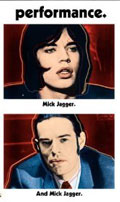
Directed by
Donald Cammell / Nicolas Roeg
101 minutes
Rated R
Reviewed by
Bernard Hemingway


Performance (1970)
Synopsis: In late '60s London, a gangster (James Fox) on the run from his former Mob bosses finds brief sanctuary in the basement flat of a reclusive rock star (Mick Jagger).
Performance is not only the best representation of the 1960s "Swinging London" scene ever laid down on film, with its sub-cultural swagger it is also an avant-la-lettre precursor to turn-of-millennium East End pulp crime films, like Lock, Stock and Two Smoking Barrels (1998) and Gangster No 1 (2001).
Content-wise the film conjures up the real interface between “Society” and criminal elements (also very effectively depicted in Lone Scherfig’s An Education, 2009) occuring at the time as the boom era of pop music and anti-bourgeois lifestyle choices, mainly permissive sex and mind-alerting drug use, fueled the fall of Established authority that had characterised Old Britain.
Formally, it is appropriately experimental, with an elliptical narrative and a bold visual style and estranging sound design that well suits the story of a disintegrating socially-defined identity, very much one of the era’s\ preoccupations. And it stars Mick Jagger, then at the height of his star power and the incarnation of everything that the Swinging '60s were about (co-star Anita Pallenberg was then Keith Richards’ girlfriend whilst Michele Breton who plays their plaything, Lucy, never made another film). The original intention was to have Jagger-Richards to provide songs for the film but in the end they only contributed one song, 'Memo From Turner' on which Ry Cooder played slide guitar)
Jagger had been critically dismissed for his lead role in Tony Richardson’s Ned Kelly released earlier in the year and if his acting here no great shakes, he is the perfect choice for the androgynous rock star, Turner. Opposite him, James Fox, who had appeared as a toff in Joseph Losey’s thematically-related classic, The Servant, in 1963 brings some in solid acting chops as Chas, the East End hard-man who finds himself well out of his depth in Turner’s bent world (apparently the shoot was so intense that Fox became a born-again Christian in his attempt to recover from it). The confrontation between Chas’s gangster world and Turner’s seedy Bohemia is brilliantly conceived and realized - both are nocturnal worlds hermetically separated from the “straight” world. However Chas, despite his criminality, brings with him the presuppositions of paternalistic authoritarianism, corrupted as they may be, and of course in the "heady" spirit of the times, it is the undoing of these that is the film's main concern.Whilst Roeg supplied the talent for the film’s bold visual realization, co-director and editor Donald Cammell wrote the script which apparently was inspired by a short story by Jorge Luis Borges, a much-read Argentinian author of the times).
Financed by Warner Bros and filmed in 1968, the studio rejected the original print which included a goodly amount of sex and drug use, neither of which were simulated, and it went through two more edits before being released in 1970 with Roeg taking his name off the credits).
The outcome is a film that unsympathetic audiences will dismiss as rambling and self-indulgent but if you know, or are interested in, the Zeitgeist of the times, it is essential viewing.
FYI: Cammell was clearly well-qualified to represent the world of artistic decadence depicted here. His father Charles Richard Cammell, a Scots poet and writer who came from a wealthy ship-building family, wrote a biography of family friend, Aleister Crowley. Cammell fils was a gifted artist, society painter and member of the "Chelsea Set” of the swinging London social scene of the 1960s.
Whilst Roeg went on to make some memorable films including Walkabout, The Man Who Fell To Earth, and Don't Look Now Cammell had a far less illustrious career. He directed Demon Seed in 1977 and White Of The Eye in 1987 which explored similar themes to Performance and used the same kind of jump editing and striking visuals. Between infrequent film and TV directing jobs he directed music videos, notably for U2. However after his 1995 film, Wild Side, was cut by its producer, he committed suicide by shooting himself in 1996.
Want something different?





